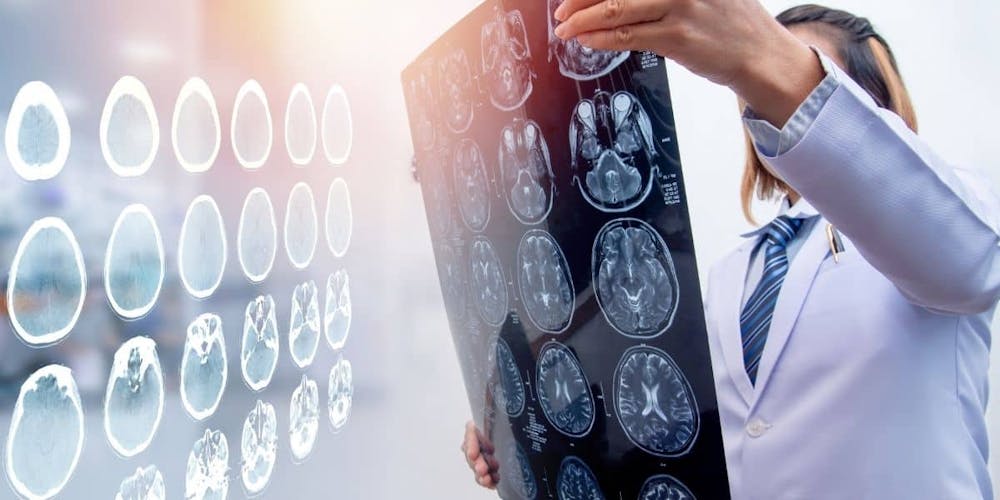
The human brain is the most complex part of our bodies. It governs every aspect of your personality, shapes how you think and feel, and records the memories you hold dear. Even minor injuries to the brain can lead to concerns for years to come. An auto accident is a common cause, but you might also slip and fall in a store or receive a blow to the head at work. Understanding traumatic brain injury can help you decide what to do next if you or a loved one ever have this experience. 
Traumatic Brain Injury (TBI)
Simply put, a traumatic brain injury (or TBI) is any type of injury to the brain caused by an external force. It doesn’t have to be caused by your head hitting another object. Some are penetration injuries, others concussion from a blast wave. Any contact between your brain and your skull can injure, with the level of damage depending on the movement of your brain and how quickly it stops. Around 1.7 million Americans sustain a TBI every year, some 270,000 require hospitalization, and about 64,000 die. TBIs are the leading cause of death among young people in this country. Even minor TBIs can result in lasting problems, due to ways the basic structure of the brain can be affected.
When nerve and brain cells are damaged, they cannot send signals to each other the way they normally do. This fundamentally disrupts the ability of your brain to process the information it receives from your senses. It may struggle to regulate your bodily functions, and control how you interact with the outside world. The brain has remarkable abilities to regenerate tissue and rewire neural pathways around damaged areas. But the amount of damage influences the severity of symptoms. Even a small specific area of damage to the brain can affect quality of life. Receiving a prompt diagnosis is critical in ensuring you can heal.
When you first see health care providers after your injury, they begin to determine the severity of your TBI. Early on the Glasgow Coma Scale may be used. It applies objective exams of your body’s responses to certain tests. Your next stop might be for a Computerized Tomography (CT) scan, where multiple x-rays create a model of your brain. This can find evidence of swelling, bleeding, blood clots, and bruising of brain tissue. Once you’re stabilized, and if your symptoms don’t go away, a Magnetic Resonance Imaging (MRI) exam may be ordered, which can supply even more detail on your brain via its use of radio waves. The intensity of your symptoms helps show just how severe your TBI is.

Brain Injury Symptoms
Even minor traumatic brain injuries can manifest in many ways. Common physical symptoms are nausea and vomiting, drowsiness, difficulty balancing and dizziness, and losing consciousness for up to a few minutes. Sensory changes can include blurred vision, difficulty hearing, a persistent bad taste in your mouth and difficulty with smell. You may be sensitive to light and sound. It’s not unusual to experience cognitive and behavioral issues. Memory and concentration can be affected, along with sudden mood swings, lasting depression and anxiety, and changes to how you sleep. If your TBI is moderate to severe, there may be even more difficulties.
Moderate to severe traumatic brain injuries may never fully heal. Physical signs may include loss of consciousness from minutes to a few hours, persistent weakness and numbness in fingers and toes, or being unable to coordinate movements. Some patients experience clear fluids draining from eyes and ears, and convulsions or seizures. Cognitive effects can range from slurred speech to deep, severe confusion and intense, lasting agitation and combativeness. TBIs in some cases also lead to disorders of consciousness, comas, and a much shorter lifespan. In addition, these symptoms and injuries are not unique to adults – children can face unique and damaging issues of their own.
A parent doesn’t always know what to do if their child can’t tell them what’s wrong. Some of the common symptoms of traumatic brain injury in children include changes in eating habits, persistent crying, depression, unusual irritability, and difficulty paying attention. These are “short term” symptoms. Children can also face developmental difficulties and difficulties in learning new things; it might be assumed they have a disability or emotional problem rather than recognizing the TBI. Treatment is most effective when done as a family unit and is broadly focused on helping children regain skills they lost and develop new ones they’d have difficulty with due to their TBI. Parents and professionals may need to help them learn to compensate as added problems occur and focus on personally meaningful goals and routines. These treatments can apply to adults as well; you want to seek treatment soon as untreated TBIs will almost certainly worsen over time.
Even traumatic brain injuries that receive medical treatment can worsen. Symptoms may be due to secondary injuries like infections or hematomas, or ongoing chemical changes like the overproduction of neurotransmitters which can lead to cell death. Brain Injuries have been found to place someone at greater risk for developing psychiatric disorders and nerve diseases like Parkinson’s, Alzheimer’s, and other forms of dementia. Trying to get back to your old life too soon can also make your symptoms worse due to the stress placed on your body and mind. But even for the most severe injuries there are options and treatment decisions you can make.

Treating Brain Injuries
All traumatic brain injuries, including concussions, need to be carefully monitored. You will want to see your doctor several times– it is very possible that rest and pain medication won’t be enough. At a minimum you will want your doctor to make sure no new signs are showing up, and that all symptoms have resolved. In the case of moderate to severe TBIs, your emergency care may include monitoring blood pressure, preventing further injury to your head and neck, ensuring your brain gets enough oxygen and blood, and if necessary, relieving pressure inside your skull. Some severe cases are put in a medically induced coma and given drugs to help drain fluids and prevent seizures. Further surgery may be needed for severe injuries like skull fractures, blood clots, built up fluids, and bleeding in the brain. After these procedures, it’s likely that rehabilitation will follow.
The more severe your traumatic brain injury, the more likely that you’ll need rehabilitation therapy alongside a longer hospital stay. Your rehabilitation process would be overseen by a physiatrist, a doctor specially trained in treatment of brain and spinal cord. You might also work with rehab and TBI specialist nurses. You may need a speech therapist to help redevelop communication skills. A physical therapist will help you regain mobility and relearn how to balance and walk. An occupational therapist can help strengthen your ability to do your daily life tasks. You might also need a case manager to help you with decisions on your care and communication between providers and agencies, a recreational therapist who can help you get back to your leisure activities, and a vocational counselor who can help you eventually return to work. All of this can require immense time and effort, and you’ll need help. One the best ways you can make sure you get it is to hire a dedicated brain injury attorney who knows what has to happen.

Hiring Brain Injury Lawyer
If you’ve been hurt by someone else, hiring a brain injury lawyer helps ensure that you’ll be compensated as you deserve. Through their own investigation, your attorney would determine just why the other party is at-fault. They would deal with costs and insurances so you can focus on your own health and recovery. In your first interview, they would emphasize that you need to be completely honest and never go against medical advice, as omitting anything and not listening to a doctor could be extremely detrimental for your case. They would provide much of the coordination and scheduling of your treatment and would follow up with your health care professionals to make sure you’re progressing in your recovery. Should it become necessary, your brain injury attorney would obtain the services of expert witnesses to boost your case.
Your primary care provider may be asked to testify as to the causation and type of injury you suffered, as well as to show support for further forms of treatment like chiropractic, physical and muscular therapy, and acupuncture. However, while having a credible MD who properly documents your injury is critical, they are not an expert witness. An expert witness is a person with a specialized skill set that can synthesize your injuries and treatment for a judge and jury in a way non-experts can understand. In some cases where your provider is unavailable, a professional and experienced expert can interpret their records as testimony. Your attorney can pay these costs up front, another benefit in hiring an attorney. It’s your attorney’s responsibility to not only decide what kinds of experts you need but select the right people in those fields to be your expert witnesses.
An examination by a neurologist is often critical, as they can show the level of damage to your brain, nerves, and spine, and then supply expert advice on how treatment should be carried out. You might undergo an Electroencephalography (EEG) exam, which measures electrical patterns and signals in your brain. From this a Quantitative EEG (qEEG) is developed to analyze those patterns and construct a map of your brain. This allows experts to evaluate how the brain is functioning and to track changes. It may also be necessary for you to undergo Positron Emission Tomography (PET), in which a radioactive isotope is injected to measure things like changes in metabolism and blood flow. These are a part of the field of neuroimaging, which studies the structure and function of the brain and central nervous system.
Neuroimaging should not be confused with neuroradiology, which uses certain neuroimaging tests in clinical settings to diagnose abnormalities in the brain and spine. Having expert practitioners in both fields to examine and diagnose is key, as these diagnoses would be essential for any neuropsychologist your attorney hires. A neuropsychologist studies the relationship between the brain and behavior and can define any changes in behavior and cognitive function you’ve suffered because of your accident. Each case is unique, and it would be up to your attorney to decide which expert is needed for your situation. The right experts can make the difference between a $50,000 and a $500,000 settlement. For extensive cases, though, it is likely that the settlement will need to be litigated.
Litigation of brain injury cases is a long and expensive process. Beyond the medical experts that need to be hired, there are also court costs, damage experts, witness interviews and medical tests. These expenses can move the costs of a case into the tens of thousands of dollars. One advantage of retaining a larger firm for your TBI case is they have the kind of available funding smaller firms and solo brain injury attorneys may not have. However, what you really need is a brain injury lawyer with the most possible experience. You will want someone who knows TBI law and knows which doctors and experts properly document their files, since this makes it much more likely you’ll get the settlement you deserve. TBI cases can take time and effort to resolve, but choosing the right attorney makes your outcome much more likely.
Traumatic brain injuries are some of the most complex and damaging injuries a person can suffer. Unfortunately, the recovery period can take years, and you may still have compromises in your quality of life. Even with the right attorney, it is a long and challenging process. We here at Park Chenaur and Associates, located in Federal Way and Tacoma, understand that this is a very difficult time for you. We have years of experience with others who have had brain injuries. We work closely with experts in many fields to show judges and juries just how much a traumatic brain injury has changed a life. We know what it takes to get our clients justice, and we will fight that fight for you.












